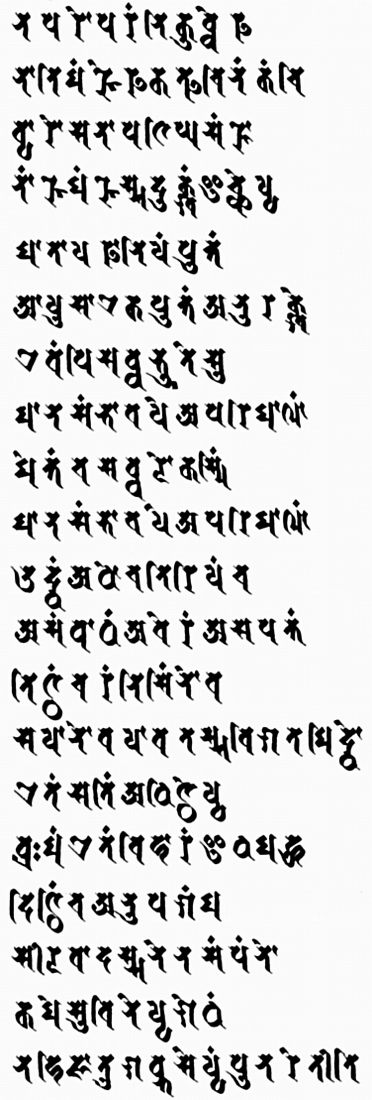This important sutta from the Pāli canon describes the Buddhist path in terms of loving kindness or mettā (Sanskrit: maitrī मैत्री). It is found in the Sutta Nipāta which is considered to be amongst the earliest layers of the composition of the canon. Also known as simply the Metta Sutta, although there is another text with that name, the Karanīya Metta Sutta is one of the best known paritta texts which were and still are chanted for protection against harm. The Pāli commentary records that it was taught to a group of bhikkhus who were having problems with tree devas. The Pāli text comes from the Pāli text society edited version.
See also my other Karanīya Mettā Sutta translation, and my translation of an exert from Buddhagosa's Pāli commentary which tells the story of how the Mettā Sutta came about.
Pāli text in Siddhaṃ script


Pāli text in roman script
Karanīyam atthakusalena
yan taṃ santaṃ padaṃ abhisamecca:
Sakko ujū ca sūjū ca
suvaco c'assa mudu anatimānī,
Santussako ca subharo ca
appakicco ca sallahukavutti
Santindriyo ca nipako ca
appagabbho kulesu ananugiddho,
Na ca khuddaṃ samācare kiñci
yena viññū pare upavadeyyuṃ
Sukhino vā khemino hontu
sabbe sattā bhavantu sukhitattā:
Ye keci pāṇabhūt' atthi
tasā vā thāvarā vā anavasesā
Dīgha vā ye mahantā vā
majjhimā rassakā aṇukathūlā
Diṭṭhā vā ye vā addiṭṭhā
ye ca dūre vasanti avidūre
Bhūtā vā sambhavesī vā
sabbe sattā bhavantu sukhitattā
Na paro paraṃ nikubbetha
nâtimaññetha katthacinaṃ kañci
Vyārosanā paṭighasaññā
nāññamaññassa dukkham iccheyya
Mātā yathā niyaṃ puttaṃ
āyusā ekaputtam anurakkhe
Evam pi sabbabhūtesu
mānasam bhāvaye aparimāṇaṃ
Mettañ ca sabbalokasmiṃ
mānasam bhāvaye aparimāṇaṃ
Uddhaṃ adho ca tiriyañ ca
asambādhaṃ averaṃ asapattaṃ
Tiṭṭhaṃ caraṃ nisinno vā
sayāno vā yāvat' assa vigatamiddho
Etaṃ satiṃ adhiṭṭheyya
brahmam etaṃ vihāraṃ idha-m-ahu
Diṭṭiñ ca anupagamma
sīlavā dassanena sampanno
Kāmesu vineyya gedhaṃ
na hi jātu gabbhaseyyaṃ punar etī ti
English Translation
(This is a fairly literal translation by Jayarava)
This is what ought to be done by one skilled in the good
Having understood the path to peace
Able, straight forward and straight up,
polite, they should be mild and not arrogant
Contented and frugal,
with few responsibilities and easy going,
grounded, and not impulsive;
not chasing status
And not doing the slightest thing
which is denounced by the Wise in others
May they have happiness and peace;
May all beings be happy in themselves
Whatever living beings there are
fearful or fearless – without remainder
Huge, large,
medium, small. Fine or coarse.
Seen or unseen,
Remote or living nearby,
Born or seeking birth:
May all beings be happy in themselves
Not humiliating,or despising
anyone anywhere
Though anger or experiencing repugnance:
[they] should not wish suffering for another.
Like a mother’s own child,
[she will] protect that only child with her life
Thus for all beings should
the heart become infinite
And friendliness for all the world,
[should] the heart become infinite
In all the directions of space,
unobstructed, peaceable, without enmity
Standing, walking, sitting
or lying down, As far as possible without sluggishness
This mindfulness should be undertaken;
[It is like] dwelling with god here and now
Not falling into views,
ethical and with perfect vision
Having given up greed for sensory pleasures,
freed without doubt from birth.
Notes
Siddhaṃ is a fine script for writing Pāli although it would not have been traditional to do so. Siddhaṃ was developed for writing Sanskrit, but the two languages are so similar that it presents few difficulties. Pāli was in fact recorded mainly in the Sinhala script in Sri Lanka and the Burmese Script in Burma - both of which also derive ultimately from Brahmi.
It's not often commented on but this "sutta" does not begin "evaṃ me sutaṃ" - thus have I heard - and does not finish with a response from the audience which are the two main criteria for a sutta. I suppose it is really an example of a gatha or verse.
